Global
Morning Consult Counter/Consensus: Global Political Risk Briefing, March 7, 2024

Morning Consult Counter/Consensus is a biweekly briefing that leverages our global analysis and Political Intelligence data to spotlight counter-consensus takes on major (geo)political developments, and affirm consensus views on issues for which data has been scarce in public discourse or otherwise adds value. The briefing is intended to facilitate corporate scenario planning, market and asset price forecasting, and public sector decision-making. Clients are welcome to reach out directly with questions.
Key Takeaways
Brazil (Consensus): Political polarization is playing out in coup probe controversy
European Union (Counter): Farmers’ protests across the European Union address different grievances
Russia (Consensus): Russians look ready to hand President Vladimir Putin another term
Sign up to receive Counter/Consensus in your inbox several hours after it publishes on Morning Consult Pro.
1. Brazil (Consensus)
Muito divididos: With roughly 37% of Brazilians espousing either a far-right or far-left political ideology as of February 2024, Brazil is among the most polarized countries in which we currently track political sentiment on a daily basis. And it shows.
Efforts to investigate former right-wing President Jair Bolsonaro for his role in the Jan. 8, 2023 Congress attack in Brasília have brought his right-wing into the streets in droves. Bolsonaro’s attempt to reframe the issue in terms of political support makes sense: A full 24% of Brazilians say they hold political views at the far-right end of the spectrum, while 13% say they hold far-left views.
Brazil: Political Polarization
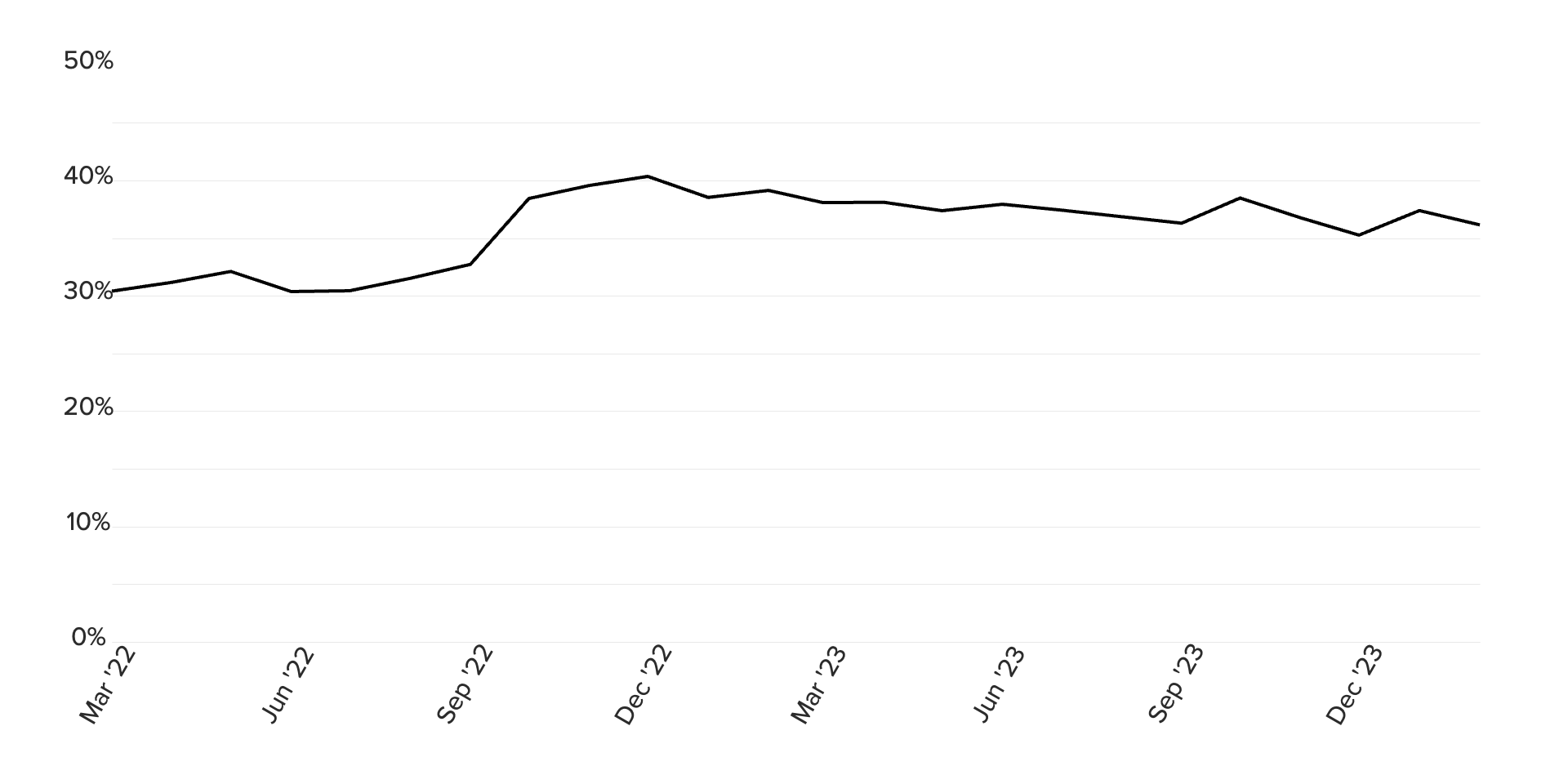
Brazil was polarized even before the October 2022 elections. But the share of Brazilians espousing extreme views jumped 10 percentage points in the lead-up to them, presaging the events of Jan. 8, 2023 in Brasília. Furthermore, while the share of Brazilian adults holding extreme ideological views has declined slightly from a post-election peak, it has not reverted to levels we saw before the ramp up.
This should be a cautionary note for other democracies with elections coming up (here’s looking at you, America and Europe). Once demagogues start stoking extremism, our data suggests it can be difficult to close that particular Pandora’s box.
2. European Union (Counter)
Sowing discord: A number of E.U. countries — including France, Germany, Poland and the Netherlands — have all experienced disruptions from farmers’ protests. And while they are often painted as a unified movement against Europe’s farm to fork strategy, looking at rural populations’ views of the European Union in different member states over time reveals a more nuanced picture.
In Poland, for example, much of rural households’ anger toward the European Union appears to stem from recent events such as the collapse of the Black Sea grain deal and the subsequent lifting of embargoes on Ukrainian grains and oilseeds on Oct. 15 of last year, as evidenced by the timing of shifts in our data on Polish favorability toward the European Union. Before those events, rural Poles were quite happy with it on balance.
Poland: Views of the European Union
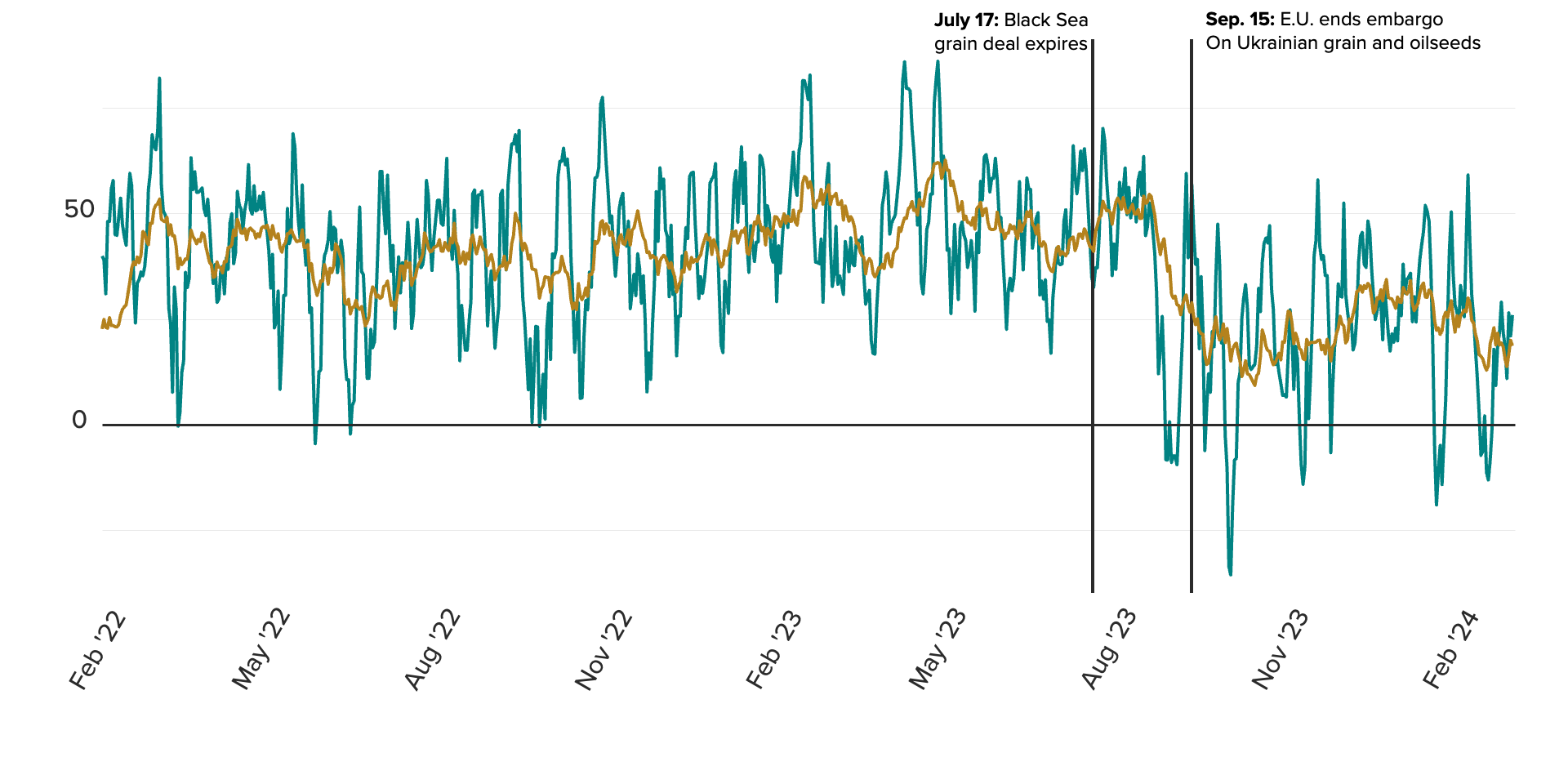
In France, the lifting of the embargoes did indeed precede a sharp dip in rural favorability of the European Union. But in contrast to Poland, French farmers’ views of the Union had gradually been sliding for some time before that.
France: Views of the European Union
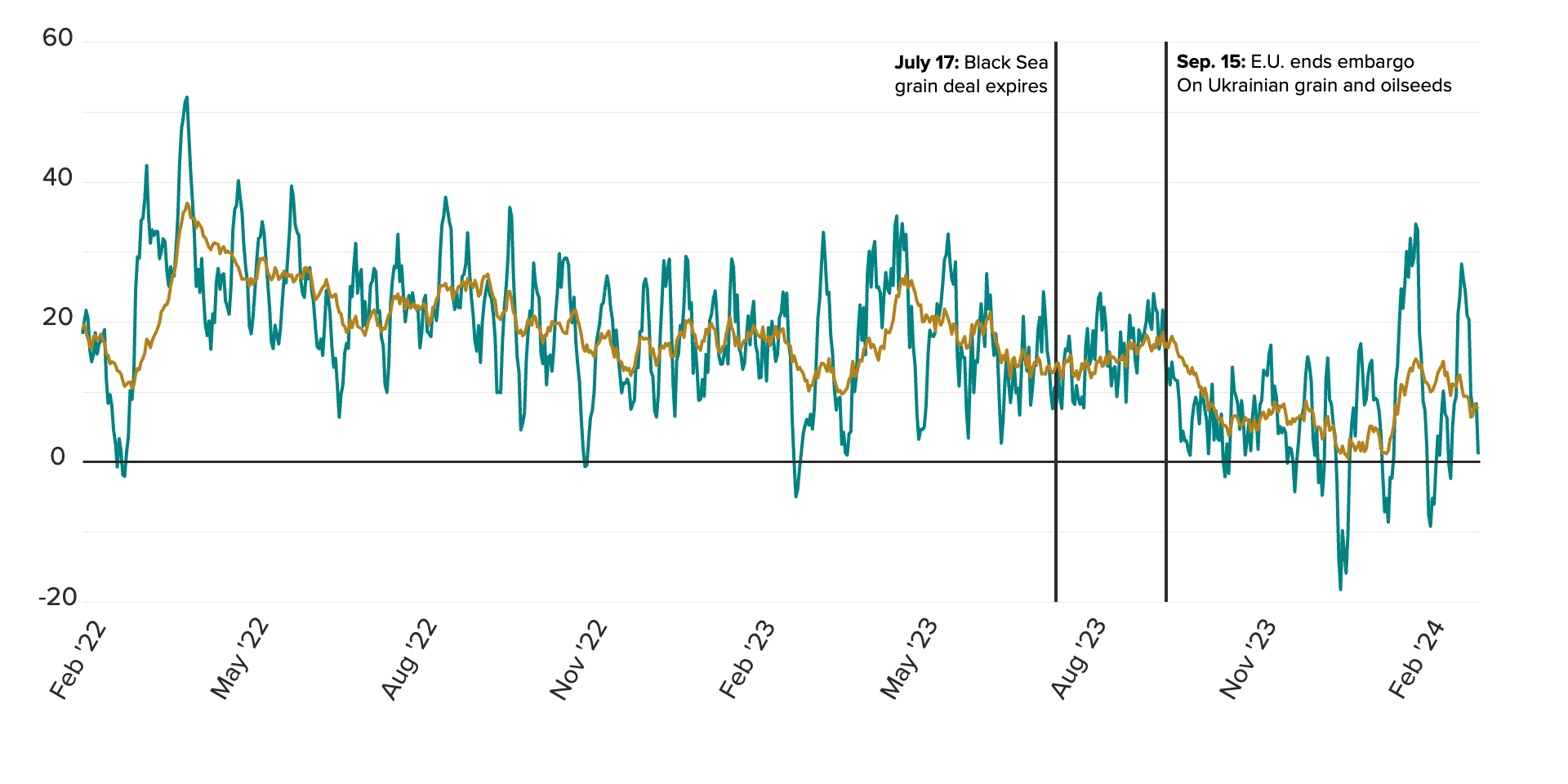
And in the Netherlands, where recent elections have set up the farmers’ protest party BBB to play possible kingmaker in coalition talks with Geert Wilders’ PVV, rural opinion of the European Union doesn’t shift as a function of Ukrainian grain issues. Instead, the 2022 escalation of farmers’ protests over stricter nitrogen controls shows up in our data as a sharp dip in net favorability toward the European Union into negative territory.
Netherlands: Views of the European Union
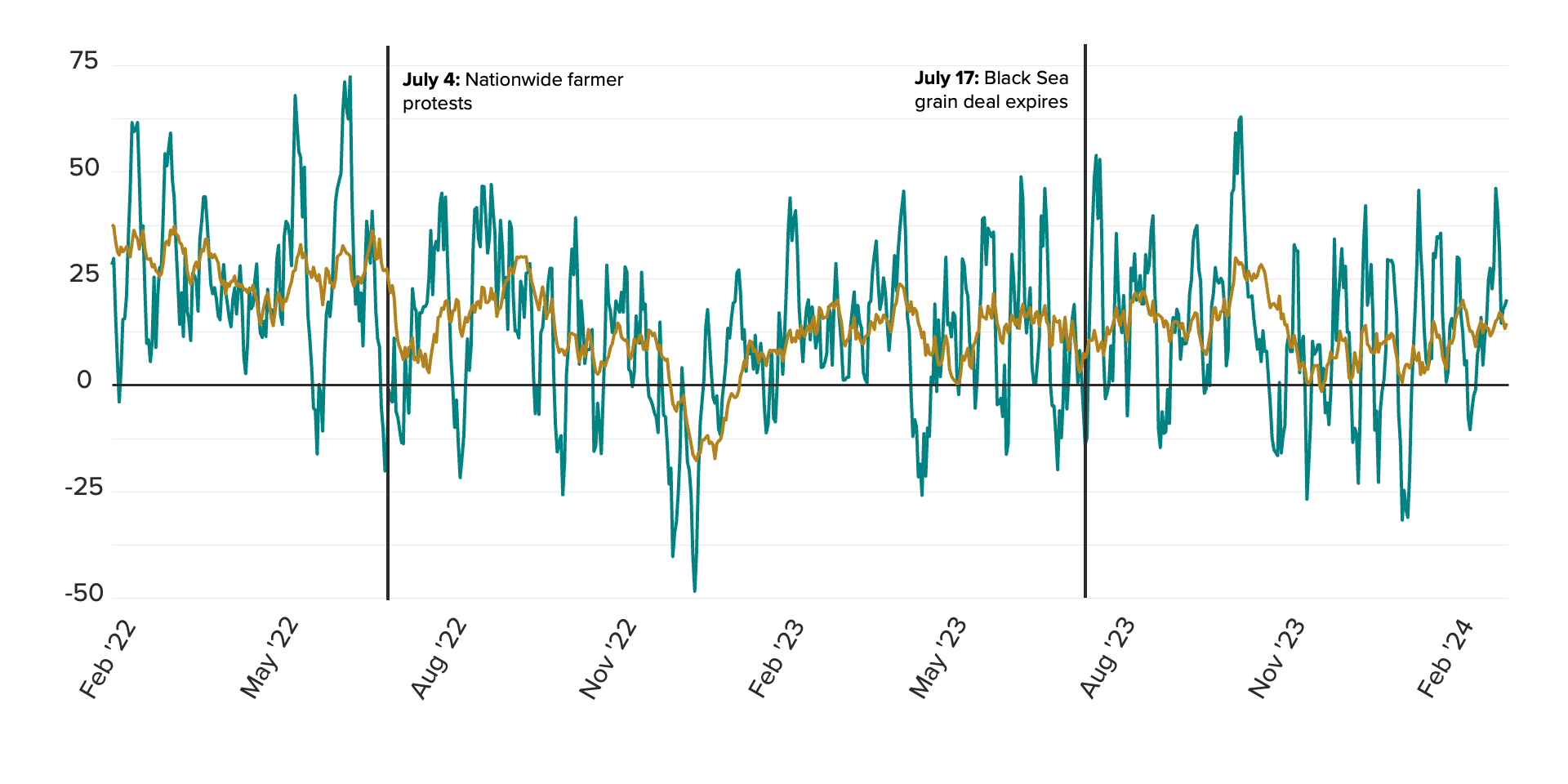
Despite country differences, there is of course a through-running thread. Farmers across the bloc complain of higher input costs and lower prices for their produce. How they interpret these phenomena — as the result of E.U. environmental policy, a failure of their national government, or the influence of foreign forces — will continue to dictate the target of their ire. Europe’s unhappy farmers may all be unhappy in their own way, but with E.U. elections on the horizon, they are certainly making their collective political voice heard.
3. Russia (Consensus)
The devil you know: The outcome of Russia’s presidential election on March 15-17 seems a foregone conclusion, as has been widely reported. Not only has Putin demonstrated his near absolute control over the electoral space following the suspicious death of opposition leader Alexey Navalny on Feb. 16 while in custody on political charges, but positive sentiment on the country’s trajectory is near a tracking high.
Russia: Country Trajectory
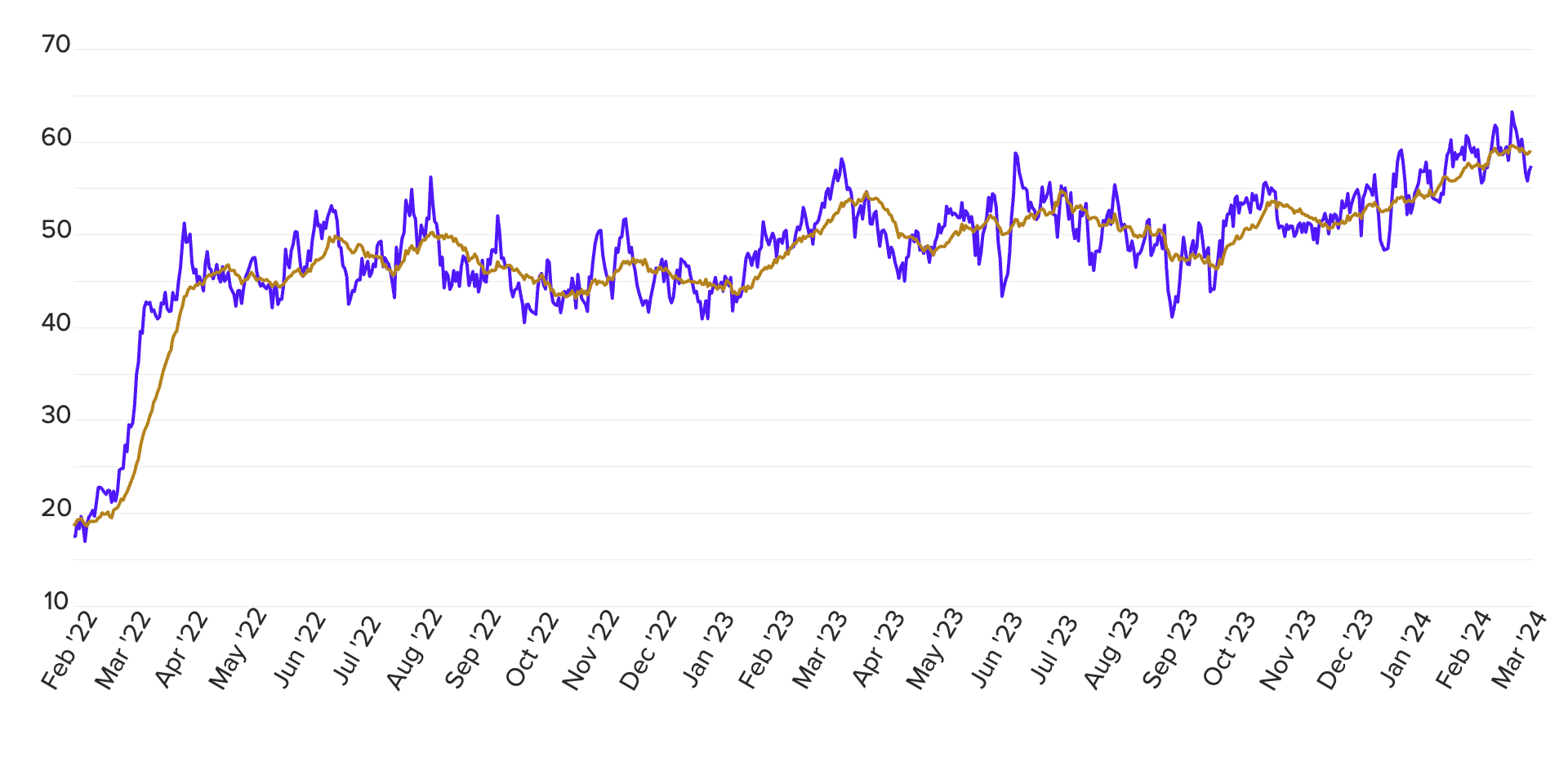
Likely buoyed by news of Russian advances in Ukraine as Zelenskyy struggles with U.S. political deadlock on additional aid, Russian adults are even more optimistic about the trajectory of their country now compared with their immediate post-invasion euphoria. Barring a black swan event, the world is facing at least six more years of Putin.
Like our data?
Data is a dish best served cold (and ideally via API). That’s why we don’t do hot takes. Please contact us with inquiries regarding Morning Consult’s Political Intelligence data and companion syndicated products, including Morning Consult Pro, the home for our global and U.S. political analysis.
Sonnet Frisbie is the deputy head of political intelligence and leads Morning Consult’s geopolitical risk offering for Europe, the Middle East and Africa. Prior to joining Morning Consult, Sonnet spent over a decade at the U.S. State Department specializing in issues at the intersection of economics, commerce and political risk in Iraq, Central Europe and sub-Saharan Africa. She holds an MPP from the University of Chicago.
Follow her on Twitter @sonnetfrisbie. Interested in connecting with Sonnet to discuss her analysis or for a media engagement or speaking opportunity? Email [email protected].
Jason I. McMann leads geopolitical risk analysis at Morning Consult. He leverages the company’s high-frequency survey data to advise clients on how to integrate geopolitical risk into their decision-making. Jason previously served as head of analytics at GeoQuant (now part of Fitch Solutions). He holds a Ph.D. from Princeton University’s Politics Department. Follow him on Twitter @jimcmann. Interested in connecting with Jason to discuss his analysis or for a media engagement or speaking opportunity? Email [email protected].